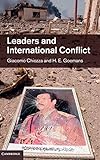Leaders and international conflict / Giacomo Chiozza and H.E. Goemans.
By: Chiozza, Giacomo.
Contributor(s): Goemans, H. E. (Hein Erich).
Material type: TextPublisher: Cambridge, UK ; New York : Cambridge University Press, 2011Description: xi, 240 p. : ill. ; 23 cm.ISBN: 9781107011724 (hardback).Subject(s): Politics and war | Political leadership | International relations | Politics and war -- Case studies | Political leadership -- Case studies | International relations -- Case studiesDDC classification: 303.66 CHI Summary: "Chiozza and Goemans seek to explain why and when political leaders decide to initiate international crises and wars. They argue that the fate of leaders and the way leadership changes shapes leaders' decisions to initiate international conflict. Leaders who anticipate regular removal from office, through elections for example, have little to gain and much to lose from international conflict, whereas leaders who anticipate a forcible removal from office, e.g. through coup or revolution, have little to lose and much to gain from conflict. This theory is tested against an extensive analysis of more than 80 years of international conflict andwith an intensive historical examination of Central American leaders from 1848 to 1918. Leaders and International Conflict highlights the political nature of the choice between war and peace and will appeal to all scholars of international relations and comparative politics"-- Provided by publisher.
TextPublisher: Cambridge, UK ; New York : Cambridge University Press, 2011Description: xi, 240 p. : ill. ; 23 cm.ISBN: 9781107011724 (hardback).Subject(s): Politics and war | Political leadership | International relations | Politics and war -- Case studies | Political leadership -- Case studies | International relations -- Case studiesDDC classification: 303.66 CHI Summary: "Chiozza and Goemans seek to explain why and when political leaders decide to initiate international crises and wars. They argue that the fate of leaders and the way leadership changes shapes leaders' decisions to initiate international conflict. Leaders who anticipate regular removal from office, through elections for example, have little to gain and much to lose from international conflict, whereas leaders who anticipate a forcible removal from office, e.g. through coup or revolution, have little to lose and much to gain from conflict. This theory is tested against an extensive analysis of more than 80 years of international conflict andwith an intensive historical examination of Central American leaders from 1848 to 1918. Leaders and International Conflict highlights the political nature of the choice between war and peace and will appeal to all scholars of international relations and comparative politics"-- Provided by publisher.
| Current location | Call number | Status | Date due | Barcode |
|---|---|---|---|---|
| Main Library West Wing General Stacks | 303.66 CHI (Browse shelf) | Available | GU-MLW22080061 |
Includes bibliographical references and index.
"Chiozza and Goemans seek to explain why and when political leaders decide to initiate international crises and wars. They argue that the fate of leaders and the way leadership changes shapes leaders' decisions to initiate international conflict. Leaders who anticipate regular removal from office, through elections for example, have little to gain and much to lose from international conflict, whereas leaders who anticipate a forcible removal from office, e.g. through coup or revolution, have little to lose and much to gain from conflict. This theory is tested against an extensive analysis of more than 80 years of international conflict andwith an intensive historical examination of Central American leaders from 1848 to 1918. Leaders and International Conflict highlights the political nature of the choice between war and peace and will appeal to all scholars of international relations and comparative politics"-- Provided by publisher.


There are no comments for this item.